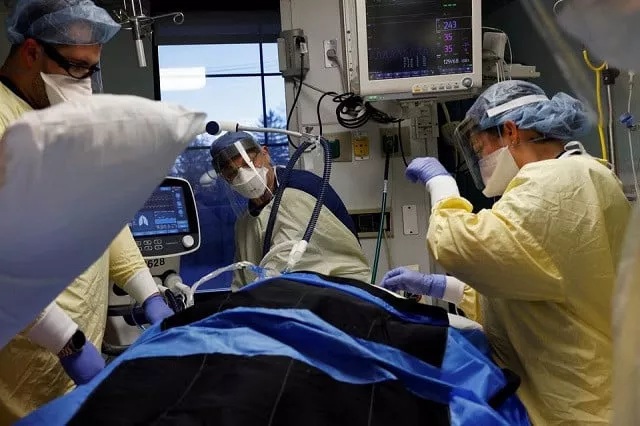Omicron pushes US Covid hospitalisations towards record high
The country reported 662,000 new cases on Thursday, the fourth highest daily US total ever recorded
WASHINGTON:Covid-19 hospitalisations in the United States are poised to hit a new high as early as Friday, according to a Reuters tally, surpassing the record set in January of last year as the highly contagious Omicron variant fuels a surge in the number of cases.
Hospitalisations have increased steadily since late December as Omicron quickly overtook Delta as the dominant strain of the coronavirus in the United States, although experts say Omicron will likely prove less deadly than prior variants.
While deemed less severe, health officials have nevertheless warned that the sheer number of infections caused by Omicron could strain hospital systems, some of which have already shown signs of distress, partly due to staffing shortages.
"I don't believe we've seen the peak yet here in the United States," Centers for Disease Control and Prevention (CDC) Director Rochelle Walensky told NBC News' "Today" program on Friday, as schools and businesses also struggle with rising caseloads.
Also read: WHO warns of Covid 'tsunami' as Omicron fuels record surges
The United States reported 662,000 new Covid cases on Thursday, the fourth highest daily US total ever recorded and just three days after a record of nearly 1 million cases was reported, according to the Reuters tally.
The seven-day average for new cases set a record for a 10th day in a row at 597,000 new infections, while Covid hospitalisations reached nearly 123,000 and appeared poised to top the record of over 132,000 set last year in the coming days.
Deaths, an indicator that lags behind hospitalisations, remain fairly steady at 1,400 a day, according to the tally, well below last year's record numbers, although they typically lag behind case numbers and hospitalisations.
"We are still seeing those numbers rising," Walensky said, noting that while cases outpaced hospitalisations and deaths, rising hospitalisations were primarily among the unvaccinated.
Delaware, Illinois, Maryland, Pennsylvania, Ohio, Vermont and Washington, D.C., all reported record levels of hospitalised Covid patients in recent days, according to the Reuters analysis.
Hospitalisation data, however, does not differentiate between cases of people admitted to hospitals for Covid-19 and so-called incidental positives: patients who were admitted and treated for issues other than Covid-19 and contracted the virus while in the hospital and are counted in coronavirus hospitalisation numbers.
Also read: Omicron detected in 89 countries, spreading rapidly: WHO
Incidental infections have occurred throughout the pandemic but might be significantly higher now due to the staggering pace of Omicron's spread - a phenomenon that has prompted state health departments to consider altering their disclosures.
Starting next week, Massachusetts hospitals will report whether admissions are primary or incidental to Covid-19, Kathleen Conti, a spokesperson for the state's department of health, said.
Rising cases have forced hospital systems in nearly half of US states to postpone elective surgeries.
While many school systems have vowed to continue in-person instruction, some have faced ad hoc closures as cases rise. Chicago Public Schools, the third-largest US education district, were closed for a third day on Friday amid a teacher walkout over Covid-19 protections.
US and other officials have said schools can be safely opened, especially amid widely available vaccines and boosters, and the CDC on Thursday issued new guidelines for schools on isolation policies.
While the United States is fighting a surge right now, the country will have to face the long-term impacts, Walensky said.
Also read: Omicron 'five times' more likely to reinfect than Delta, no milder: study
"We are definitely looking at a time ahead of us where Covid ... will be an endemic virus," the CDC director told NBC.
Officials continue to press vaccinations as the best protection against Covid, although federal mandates requiring them have become politically contentious.
Later on Friday, the US Supreme Court will weigh requests to block President Joe Biden's vaccine mandate for larger employers and a separate similar requirement for healthcare facilities.
The US Food and Drug Administration on Friday shortened the interval between the primary series of the Moderna Covid-19 vaccine and a booster dose by a month for people aged 18 or above to at least five months.
The regulatory decision comes days after the agency made a similar move and cut the interval for booster shot eligibility to five months from six for the Pfizer and BioNTech Covid-19 vaccine. The Pfizer booster shot has also been authorized for use in children aged 12 to 15.


COMMENTS
Comments are moderated and generally will be posted if they are on-topic and not abusive.
For more information, please see our Comments FAQ